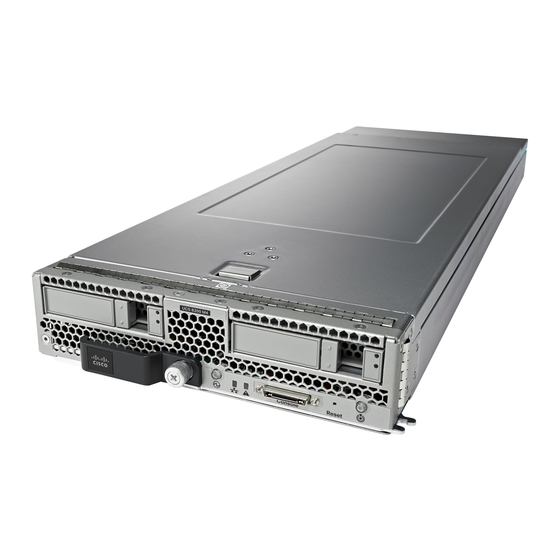- ページ 3
サーバー Cisco UCS B200 M4のPDF 整備マニュアルをオンラインで閲覧またはダウンロードできます。Cisco UCS B200 M4 24 ページ。 For e5-2600 v4 series cpus
Cisco UCS B200 M4 にも: インストールとサービスノート (30 ページ), インストールとサービスノート (46 ページ), アップグレードマニュアル (9 ページ)

Servicing a Blade Server
If you need to move a RAID cluster, see the
4K Sector Format SAS/SATA Drives Considerations
• You must boot 4K sector format drives in UEFI mode, not legacy mode. See the procedure in this section
• Do not configure 4K sector format and 512-byte sector format drives as part of the same RAID volume.
• Operating system support on 4K sector drives is as follows: Windows: Win2012 and Win2012R2; Linux:
Setting Up UEFI Mode Booting in the UCS Manager Boot Policy
Procedure
Step 1
In the Navigation pane, click Servers.
Step 2
Expand Servers > Policies.
Step 3
Expand the node for the organization where you want to create the policy.
If the system does not include multitenancy, expand the root node.
Step 4
Right-click Boot Policies and select Create Boot Policy.
The Create Boot Policy wizard displays.
Step 5
Enter a unique name and description for the policy.
This name can be between 1 and 16 alphanumeric characters. You cannot use spaces or any special characters
other than - (hyphen), _ (underscore), : (colon), and . (period). You cannot change this name after the object
is saved.
Step 6
(Optional) After you make changes to the boot order, check the Reboot on Boot Order Change check box
to reboot all servers that use this boot policy.
For boot policies applied to a server with a non-Cisco VIC adapter, even if the Reboot on Boot Order Change
check box is not checked, when SAN devices are added, deleted, or their order is changed, the server always
reboots when boot policy changes are saved.
Step 7
(Optional) If desired, check the Enforce vNIC/vHBA/iSCSI Name check box.
• If checked, Cisco UCS Manager displays a configuration error and reports whether one or more of the
• If not checked, Cisco UCS Manager uses the vNICs or vHBAs (as appropriate for the boot option) from
Step 8
In the Boot Mode field, choose the UEFI radio button.
Step 9
Check the Boot Security check box if you want to enable UEFI boot security.
for setting UEFI boot mode in the boot policy.
RHEL 6.5, 6.6, 6.7, 7.0, 7.2, 7.3; SLES 11 SP3, and SLES 12. ESXi/VMWare is not supported.
vNICs, vHBAs, or iSCSI vNICs listed in the Boot Order table match the server configuration in the
service profile.
the service profile.
4K Sector Format SAS/SATA Drives Considerations
Cisco UCS Manager Troubleshooting Reference
Servicing a Blade Server
Guide.
3
